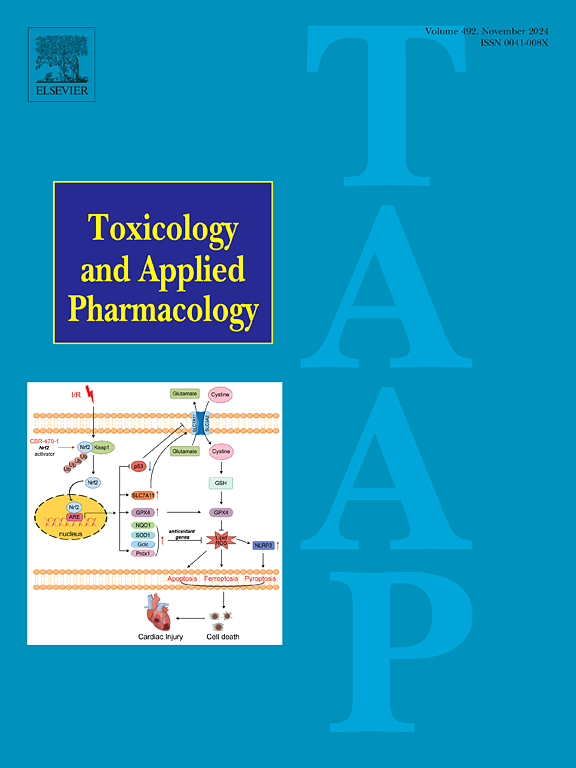网络药理学和实验验证表明,硫霉素通过抑制肠道衰老和调节NF-κB/AMPK信号通路改善小鼠右旋糖酐硫酸钠诱导的结肠炎。
IF 3.4
3区 医学
Q2 PHARMACOLOGY & PHARMACY
引用次数: 0
摘要
背景:溃疡性结肠炎(UC)是炎症性肠病(IBD)的一种常见亚型,是一种慢性、非特异性炎症性肠病,其特征是结肠黏膜持续炎症,肠屏障功能受损,反复出现腹泻、便血等临床表现。最近的研究表明,细胞衰老在UC的发病机制中起着关键作用,衰老细胞通过分泌衰老相关分泌表型(senescence associated secretory phenotype, SASP)加剧肠道炎症,SASP主要由促炎因子组成。硫胺霉素(Thiamphenicol, TP)是一种广谱抗生素,具有抗炎和抗衰老的特性。方法:本研究旨在探讨TP是否通过调节NF-κB/AMPK信号通路,减轻DSS诱导的小鼠UC。建立dss诱导的NCM460细胞衰老模型和dss诱导的小鼠UC模型,系统评价TP对细胞衰老、结肠炎症和肠道屏障功能的影响;通过网络药理学和体内/体外实验验证其在NF-κB/AMPK通路中的调节作用。结果:TP通过NF-κB/AMPK调控,显著减少衰老细胞积累,下调促炎细胞因子(IL-1、IL-6、TNF-α),减轻dss诱导的结肠炎,恢复紧密连接蛋白(ZO-1、Occludin、Claudin-1)的表达,改善肠屏障完整性。结论:TP通过调节NF-κB/AMPK通路改善细胞衰老和炎症反应,从而为UC治疗提供了新的见解和潜在的治疗策略。本文章由计算机程序翻译,如有差异,请以英文原文为准。
Network pharmacology and experimental validation reveal Thiamphenicol ameliorates dextran sulfate sodium-induced colitis in mice via inhibition of intestinal senescence and modulation of the NF-κB/AMPK signaling pathway
Background
Ulcerative colitis (UC), as a prevalent subtype of inflammatory bowel disease (IBD), is a chronic, non-specific inflammatory bowel disease characterized by persistent inflammation of the colonic mucosa, impaired intestinal barrier function, and recurrent clinical manifestations such as diarrhea and hematochezia. Recent studies have revealed that cellular senescence plays a pivotal role in UC pathogenesis, wherein senescent cells exacerbate intestinal inflammation through the secretion of the senescence-associated secretory phenotype (SASP), which primarily consists of pro-inflammatory factors. Thiamphenicol (TP), a broad-spectrum antibiotic, has exhibited promising anti-inflammatory and senescence-modulating properties beyond its conventional antimicrobial effects.
Methods
This study aimed to investigate whether TP alleviates dextran sulfate sodium (DSS)-induced UC in mice by mitigating cellular senescence and modulating the NF-κB/AMPK signaling pathway. DSS-induced senescence models in NCM460 cells and DSS-induced murine UC models were established to systematically evaluate the effects of TP on cellular senescence, colonic inflammation, and intestinal barrier function; network pharmacology and in vivo/in vitro experiments were employed to validate its regulatory role in the NF-κB/AMPK pathway.
Results
TP significantly reduced senescent cell accumulation, downregulated pro-inflammatory cytokines (IL-1, IL-6, TNF-α) via NF-κB/AMPK modulation, attenuated DSS-induced colitis, and restored the expression of tight junction proteins (ZO-1, Occludin, Claudin-1), thereby improving intestinal barrier integrity.
Conclusion
TP ameliorates cellular senescence and inflammatory responses through modulation of the NF-κB/AMPK pathway, thereby providing novel insights into and potential therapeutic strategies for UC treatment.
求助全文
通过发布文献求助,成功后即可免费获取论文全文。
去求助
来源期刊
CiteScore
6.80
自引率
2.60%
发文量
309
审稿时长
32 days
期刊介绍:
Toxicology and Applied Pharmacology publishes original scientific research of relevance to animals or humans pertaining to the action of chemicals, drugs, or chemically-defined natural products.
Regular articles address mechanistic approaches to physiological, pharmacologic, biochemical, cellular, or molecular understanding of toxicologic/pathologic lesions and to methods used to describe these responses. Safety Science articles address outstanding state-of-the-art preclinical and human translational characterization of drug and chemical safety employing cutting-edge science. Highly significant Regulatory Safety Science articles will also be considered in this category. Papers concerned with alternatives to the use of experimental animals are encouraged.
Short articles report on high impact studies of broad interest to readers of TAAP that would benefit from rapid publication. These articles should contain no more than a combined total of four figures and tables. Authors should include in their cover letter the justification for consideration of their manuscript as a short article.

 求助内容:
求助内容: 应助结果提醒方式:
应助结果提醒方式:


